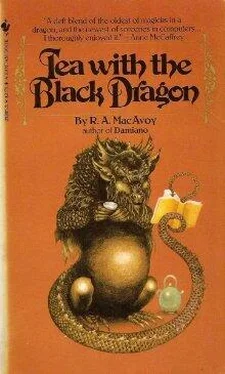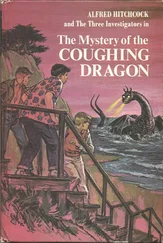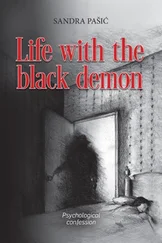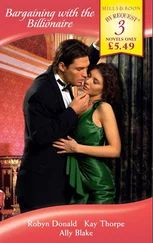Not at home; her own ceiling was plastered, with a crack through it like a lightning bolt, and the fixtures wore white paper lanterns. Besides, Martha knew she was not at home; she was staying at the James Herald Hotel. Which did not look anything like this. Those ceilings were arched, and the picture moldings were impressively Corinthian.
She felt so awful that maybe she was in a hospital. Yes. She had passed out on the street. Someone in a black car had spoken her name…
And now she just had to go to the bathroom, dizzy or not. She pulled her eyes open.
How very odd. She was stretched out flat on a table. Brightly colored lengths of wire were wrapped around her wrists, tying them together in front of her.
“Out that door and to the left,” said a voice. She searched for the speaker.
He sat sprawled in a white director’s chair, amidst a clutter of magazines. He was a small man whose dark hair was carefully slicked back and curled about the ears. He wore a wine-red shirt which hung open, revealing a gold medallion. His belt was wide and black, his trousers white. His voice matched his appearance perfectly.
Martha tried to sit up; it was a hopeless effort.
“I can’t do anything without my hands.”
He stared insolently and flung another magazine to the floor. He lounged across the barren room toward her. In his hands were black steel dikes, he snipped through the skinny windings on her wrists.
“Try to run and I’ll break your leg,” he said, as she slipped off the wooden table. “There’s nowhere to go, anyway.”
He was quite correct. The tall, barnlike room had no windows and only two doors. One of the two was green metal. It had a key lock and a hole beneath where the doorknob had once been. The other door stood open, and as Martha passed through it, leaning on the doorsill for support in her vertigo, she saw that it led through a short hall to two other doors. One of them was identical to the door in the large room, except that it had a knob on it. The other door was wood.
She turned the knob on the green door. It was locked. “Other door,” came the voice behind her. It was a nasty voice, the sort of voice which might make a child cry, hearing it say “other door” in that sneering fashion. It was the sort of voice that would want to. Martha turned and passed through the wooden door.
“You are very mistaken in this,” repeated Martha. “No one I know has more than four hundred dollars in the bank.”
“The less I hafta say, the better off you’ll be,” grumbled her captor, as he rummaged around on the floor. He had leafed through all his magazines while his prisoner was unconscious, not reading them, but reading the captions on all the pictures and spoiling the interest of them, and so now had nothing to read.
“You’ve said that twice in the last hour, and you must know by now it doesn’t shut me up.”
He raised his eyes. “Less you say, happier I’ll be,” he added.
Mrs. Macnamara sat only a few feet from his chair. A small pile of discarded magazines kept her from the chill of the floor. Her feet were folded on her thighs in the full lotus posture. She had spent a large part of the day in this position, and now daylight was fading from the crack beneath the green door. Had it been just one day since the trip to the Valley and the lunch in the tea shop with Mayland Long?
She remembered the car, and how a man had leaned out, smiling, and taken her hand. She remembered the open door. The yank on her arm. The hankie with its operating-room stink.
That was how she got her nose burned, she decided. Ether, or chloroform, or whatever.
Had no one seen this? Where was Mayland? He’d been right beside her. He just found that flower, and given it to her. So very romantic, but silly, too, in his dignified, almost pedantic manner. Had they snatched him too? Had they killed him? The thought was unbearable.
And what about Liz? A spasm of fear nearly cut off Mrs. Macnamara’s breathing. Liz was the hub around which all this mystery revolved. Though Martha Macnamara pleaded ignorance of the affair, pretending to assume she was being held for ransom, she knew that her capture was tied in with her daughter’s trouble. Oh Liz, Liz! What had she done to herself?
And what a silly grief it would be to her to find that her mother was kidnapped, just because she had called her for help. Or that her mother was dead.
The floor glinted with brass snippets. Huge soft dust kitties rolled ponderously whenever the man threw a magazine.
Except for the table on which Martha had awakened, a dirty white refrigerator, and the director’s chair—also white, also dirty—the room was empty. No sound leaked in from the outside world.
Martha felt despair well up from her chest to her throat. She let it sit there, paying attention to her breathing instead.
The first drops of rain spattered against the windshield. Long had been expecting them since the wind turned from the north. The wet air summoned a host of visions to his mind—the bare, black cliffs in the rocks above Taipei. Old eyes filmed with blue, and a mouth of bad teeth, rudely laughing. Laughing at him, while the rain came down. He shook his head against these inchoate memories.
The freeway was quiet, at 9:45 on this Thursday evening, but it was treacherous with the first rain of the season. He kept the speedometer hovering around seventy-five. The neon signs of bars and cheap motels sparkled by, diffracted in each clinging drop.
He believed that Martha was not dead. He believed this strongly, but it gave him no feeling of security, because it was a belief not under his control. If suddenly that belief went out, like a candle—a candle in the rain…
He hit a pothole, skidded across the lane and recovered automatically. His conviction that Martha was alive was not a feeling like his anger, which he could test and find durable. It was rather a gift from outside, and Long had never trusted gifts.
Pink billows of oleander filled the median strip. Long’s thoughts drifted to Liz Macnamara. He relived his interview with her: her courage and her terror, her sudden shifts of mood, the remarkable concessions he had found himself making to her.
She was like her mother, yes, but much stormier. And at the same time, more fragile. He remembered her head on his shoulder, her hair against his face. He was disturbed, not by the incident, but by his reaction to it.
But mankind had always been like that, turned off its course by a step, by the turn of a mouth, by a covert glance, or scented hair. Should he be any different? His teeth ground together as he considered; was he any different? He was alone with the hiss of Wet tires on wet concrete.
He turned off both engine and lights on Dover Park Avenue, and he coasted to a stop by the curb.
The world was gray and insular, filled with rain. His excellent hearing listened for more. He heard televisions. The thin voice of public entertainment floated from house after house as he walked. The same two speakers, repeated endlessly. No conversation. No music.
Rain beaded on his heavy black hair and in his eyelashes. It was not so bad to be wet, while the weather was warm.
Rasmussen’s neighborhood was new; it lacked streetlights. Mr. Long passed down the street invisibly, the sound of his footsteps swallowed by the rain.
The house took shape from the grayness. It sprawled on a low hill, set on a corner a little apart from its neighbors. A board set on a spike by the street announced the address.
The sloping yard had been sodded quite recently. The scars between the strips had not healed; they bled red clay. No garden, outcrop nor tree interfered with the sweep of lawn to the house. The doorway was flat against the wall of the house, and that wall itself was white stucco. The windows were dim, but somewhere within the shell of the house at least one light was lit. Gazing along the prospect of the sidewalk, his sigh melted into that of the rain.
Читать дальше












